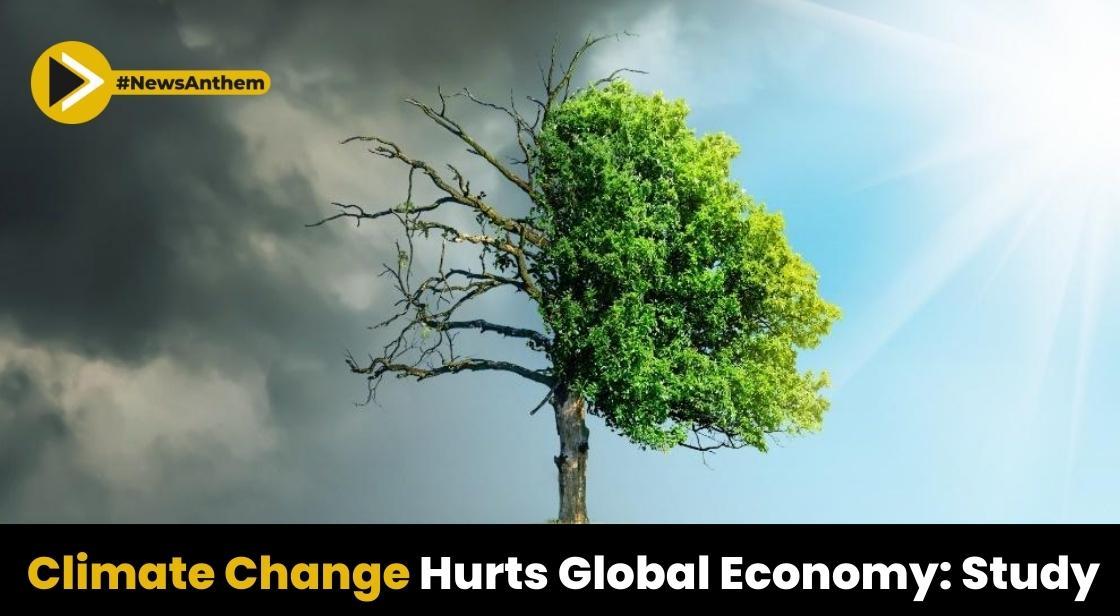Climate Change's Economic Toll: 59 Nations Brace for Mounting Debt Crisis Over the Next Decade

News Synopsis
Climate Change Could Lead to Soaring Debt Burden for 59 Countries in Next 10 Years
A new study by the University of East Anglia and the University of Cambridge has found that climate change could lead to soaring debt servicing costs for 59 countries within the next decade.
The study, which was published in the journal Nature Climate Change, found that if the world fails to meet the Paris Climate Agreement's goal of limiting global warming to 2 degrees Celsius, then countries could face debt burdens that are hundreds of billions of dollars higher than they would otherwise be.
The study's authors say that the findings should serve as a wake-up call to policymakers, who need to take urgent action to mitigate climate change.
The Economic Impact:
Climate change's economic repercussions are already evident, with recent heatwaves chipping away at global output by 0.6 percent. Researchers emphasize the potential for higher borrowing costs, resulting in elevated corporate debt, which could hamper economic growth and stability.
Challenges to Rating Agencies:
While the urgency of addressing climate change is clear, rating agencies have approached quantifying climate-related risks cautiously within their assessments.
The collaborative effort between the University of East Anglia and the University of Cambridge introduces a novel approach. By integrating AI models and climate economic projections, they devise a 'climate-adjusted' rating system to address these challenges.
AI-Powered Insights:
This innovative study harnesses AI models and economic climate projections to redefine credit ratings. Initial S&P Global ratings serve as the foundation for training AI models. These models, in combination with S&P's natural catastrophe risk evaluations, generate new ratings tailored for various climate scenarios.
Future Scenarios:
Should global efforts align with the goals of the Paris Climate Agreement, containing temperature rise below two degrees Celsius, the short-term impact on sovereign credit ratings would be minor. In contrast, a worst-case scenario involving high emissions could precipitate a substantial surge in global debt servicing expenses.
Vulnerability Across Nations:
Developing nations with lower credit scores are particularly susceptible to the physical aftermath of climate change. Even countries with higher credit rankings face potential downgrades due to the potential abrupt economic downturns. This urgency highlights the universal stakes of the climate battle.
Rating Agencies' Initiatives:
Rating agencies acknowledge the growing importance of climate-related factors in their evaluations. S&P Global Ratings discloses its Environmental, Social, and Governance (ESG) principles, recognizing the threat of economic harm from climate change. Fitch Ratings incorporates environmental vulnerability into its "ESG Relevance Scores" approach.
Key Findings
-
The study found that 59 countries are at risk of facing a massive debt burden due to climate change.
-
These countries are mostly developing countries, but they also include some developed countries, such as China, India, and the United States.
-
The study found that the cost of climate change could lead to credit score downgrades for these countries, making it more difficult for them to borrow money.
-
The study also found that the economic damage caused by climate change could lead to increased corporate debt.
Implications
The study's findings have a number of implications for the global economy.
-
First, the study shows that climate change is a serious threat to the global economy.
-
Second, the study shows that the cost of climate change is likely to be much higher than previously thought.
-
Third, the study shows that climate change is likely to have a disproportionate impact on developing countries.
-
Fourth, the study shows that climate change is likely to lead to increased corporate debt.
What can be done?
The study's authors say that the only way to avoid these negative consequences is to take urgent action to mitigate climate change.
-
This means reducing greenhouse gas emissions and investing in adaptation measures.
-
It also means providing financial assistance to developing countries to help them cope with the effects of climate change.
The study's findings are a stark reminder that climate change is a serious threat to the global economy. Policymakers need to take urgent action to mitigate climate change and avoid the negative consequences that are outlined in this study.
Conclusion:
The collision between climate change and global economics intensifies as countries grapple with rising debt burdens. This study's insights underscore the necessity for collective action to address climate change's consequences and preserve economic stability.
As rating agencies adapt their methodologies and the world strives to achieve sustainable goals, the hope is to mitigate the severe impacts that climate change threatens to impose on economies worldwide.
You May Like









